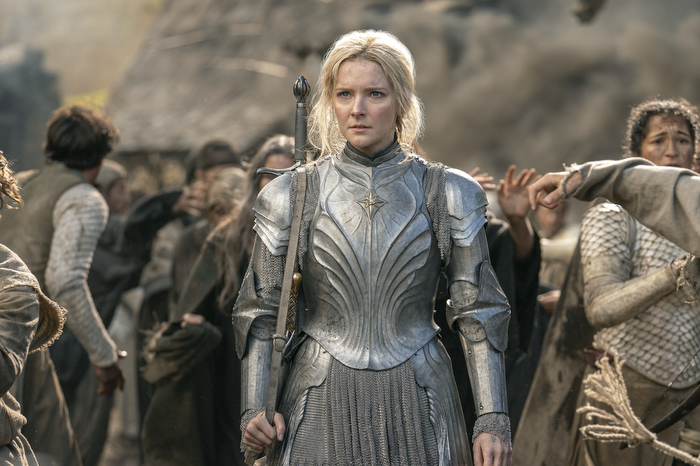
The most expensive TV series ever produced made its worldwide debut last night on Amazon Prime and while there wasn’t a unanimous consensus over its quality and impact (as if there ever would be), the majority of reviewers gushed over it.
“This is TV that is made for big screens, although surely destined to be watched on smaller ones,” said The Guardian. “It is so cinematic and grand that it makes 'House of the Dragon' look as if it has been cobbled together on Minecraft.”
The first two episodes of the Tolkien tales, a "prequel" of sorts to the original “Lord of the Rings” cinematic trilogy, revolve around the second age of Middle Earth and premiered at the same time around the globe (9 p.m. ET in the U.S.), an unusual tactic for an on-demand, nonlinear streaming service, but somehow appropriate considering its anticipated cultural impact.
The much-hyped series, which reportedly cost more than $1 billion to produce over five seasons, cut no corners when it came to special effects, which, according to Variety, involved 20 VFX studios and 1,500 artists creating more than 9,500 visual effects. Studios and vendors involved included Industrial Light and Magic, Weta, Ncam, Blackmagic Design, ARRI and DNEG.
In its own review, Variety acknowledged the influence that that load of cash had on the series production values.
“It may take some time yet to fully absorb the fact that Amazon literally dropped $1 billion on its 'Lord of the Rings' show, but at least you can see where the money went,” Variety said. “It’s difficult to think of a single television production not named ‘Game of Thrones’ that has ever felt quite so vast and, yes, epic. ‘The Rings of Power' doesn’t feel small compared to the movies, nor does it feel unworthy of them. We can bemoan the fact that seemingly everything has to be an expanded universe these days, but we can also be happy when they’re good.”
The New York Times was a bit more cagey, noting that the series was a bit predictable but praising its production values.
The professional video industry's #1 source for news, trends and product and tech information. Sign up below.
“If the ambitious first season does not reinvent the ring, it is a breathtaking reproduction that adds a few new filigrees,” it said.
Entertainment Weekly was less charitable, calling it a "catastrophe."
“There are ways to do a prequel, and 'The Lord of the Rings: The Rings of Power' does them all wrong,” it said. “It takes six or seven things everyone remembers from the famous movie trilogy, adds a water tank, makes nobody fun, teases mysteries that aren't mysteries, and sends the best character on a pointless detour.”
There was also criticism over casting for Middle Earth, with some pushing back against hiring minorities (one Twitter critic even suggesting that the series was more “token” than Tolkien). A piece on NBC’s Think website pushed back against such criticisms, pointing to producers’ attempts to balance the elements of subtle racism in Tolkiens' original writings with the realities of today’s culture.
“The new Amazon Prime series, 'The Lord of the Rings: The Rings of Power,' which is based on Tolkien’s work, makes a deliberate effort to quietly confront that uncomfortable legacy through its casting choices. It’s an admirable decision, but it’s limited by the deeply ingrained ideas of racial difference and racial determinism in Tolkien’s world,” said Noah Berlatsky, cultural critic, who goes on to say that the series “does an admirable job of rejecting the animosity toward Black and Asian people found in Tolkien’s work. But like so many fantasy (and nonfantasy stories), it still ties adventure, virtue and empowerment to the righteous genocidal slaughter of some other hated race.”
Over at Rotten Tomatoes, seen as one of the most influential arbiters of media taste, there is a huge discrepancy between critics and viewers, with the overall current Tomatometer at 83% and viewer score at 37%. On Metacritic, the series has received a middling 3 out of 5 score and iMDB rating it 6.3 out of 10.
As for ratings, it could take awhile before Amazon releases the numbers. Unlike traditional broadcasters who have to provide immediate gratification to its advertisers, streaming services are less transparent in releasing viewer numbers.
“It’s likely that Amazon will send out a press release after the weekend touting the show’s global reach and possibly about how it sparked additional demand for Prime Video,” said The Hollywood Reporter. “It’s just as likely that any such release will contain little to no supporting data.”
Tom has covered the broadcast technology market for the past 25 years, including three years handling member communications for the National Association of Broadcasters followed by a year as editor of Video Technology News and DTV Business executive newsletters for Phillips Publishing. In 1999 he launched digitalbroadcasting.com for internet B2B portal Verticalnet. He is also a charter member of the CTA's Academy of Digital TV Pioneers. Since 2001, he has been editor-in-chief of TV Tech (www.tvtech.com), the leading source of news and information on broadcast and related media technology and is a frequent contributor and moderator to the brand’s Tech Leadership events.

